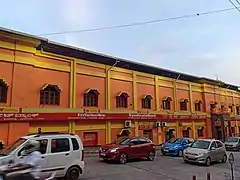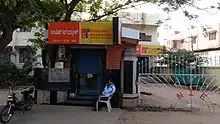Syndicate Bank
Syndicate Bank was one of the oldest and major commercial banks of India. It was founded by Upendra Ananth Pai, T. M. A. Pai and Vaman Srinivas Kudva. At the time of its establishment, the bank was known as Canara Industrial and Banking Syndicate Limited. The bank, along with 13 major commercial banks of India, was nationalised on 19 July 1969, by the government of India. It was headquartered in the university town of Manipal, India. On 1 April 2020, the bank was merged into Canara Bank.
 | |
| Formerly | Canara Industrial and Banking Syndicate Limited |
|---|---|
| Type | Public |
| BSE: 532276 NSE: SYNDIBANK | |
| Industry | Banking Financial services |
| Founded | 1925 in Manipal, India |
| Founders | |
| Defunct | 1 April 2020 |
| Fate | Merged with Canara Bank |
| Successor | Canara Bank |
| Headquarters | , India |
Areas served | |
Key people |
|
| Products | Finance and insurance Consumer Banking Corporate Banking Investment Banking Investment Management Private Equity Mortgages Credit Cards |
| Revenue | |
| Total assets | |
Number of employees | 34,054 (2019) |
| Capital ratio | 14.23% (2019) |
| Footnotes / references [1] | |
History
1925 – 1974

Syndicate Bank was founded in 1925 in Manipal, Udupi, Princely State of Mysore. The promoters came from a lower-middle-class background and aimed to improve the socioeconomic status of the region. It was the only Indian bank with its headquarter in a rural area. The bank provided employment opportunities to the educated members of the local community. It had an initial paid-up capital of ₹8,000. It was unlike other banks which primarily financed trade and industries in urban areas. So as a new bank, Syndicate Bank decided to exploit the untapped small and medium enterprise and the agriculture sector.[2] Thus, Syndicate Bank was focussed on grassroot banking since the beginning.[3]
In 1928, Syndicate Bank started the Pigmy Deposit Scheme. Under this scheme, banking agents travel to the doorstep of farmers and shopkeepers at set intervals to collect deposits. By 1960, 21% of the bank's net deposits came from Pigmy Deposits. Its unconventional practices had been criticised by the Reserve Bank of India (RBI).[3] Syndicate Bank used to encourage its employees to work as Pigmy Deposit agents, during their spare time. In 1962, RBI barred it from using its employees as bank agents.[2]
In 1950, the share of Syndicate Bank in the banking business was negligible. In 1960, it rose to 1% and to 4% in 1975. In 1968, 32% of its branches were in rural areas, whereas only 22% of branches of the entire banking system were rural. Its loans to the agriculture and small enterprises sector constituted 30% of its total loans, for the other banks it was less than 8%. 90% of its accounts were small accounts i.e., below ₹1,500. In 1969, it was nationalised along with 13 other major banks.[2] In December 1969, it had 350 branches, by December 1974, it had 700 branches.[4]
1975 – 2000
In 1975, it established the first Regional Rural Bank (RRB) of India, Prathama Bank, in Moradabad, Uttar Pradesh.[4] In 1976, Syndicate Bank sponsored the establishment of Malaprabha Grameena Bank in Dharwad, Karnataka. In 1983, Bijapur Grameena Bank was sponsored by Syndicate Bank, headquartered in Bijapur.[5] In 1984, it also founded Netravati Grameena Bank in Mangalore and Varada Grameena Bank in Kumta.[6] By December 1986, it had 1456 branches.[4]
In the fiscal year 1996–97, it posted an accumulated loss of ₹1,003 crore (US$130 million) and a profit of ₹20 crore (US$2.5 million). In December 1997, K. V. Krishnamurti was appointed the chairman and managing director (CMD) of the bank. He found the bank overstaffed which was lowering the employee productivity. Krishnamurti stopped recruitments and encouraged voluntary retirement. By 2000, the workforce had been cut by 2,777. The bank leveraged its 1,702 branches and introduced new schemes to mobilise low cost deposits. In the fiscal year 1999–2000, it posted a profit of ₹347 crore (US$43 million).[7]
In the fiscal year 1997–98, it was reported that Pigmy Deposits still contributed 15.6% of its domestic deposits and 5.6% of its global deposits.[3] In October 1999, Syndicate Bank held its first initial public offering (IPO). It offered 12.5 crore equity shares worth ₹125 crore (US$16 million) at par. The IPO diluted the stake of the Government of India to 76%.[8] In February 2000, it was reported that the bank had further reduced its staff strengthen by 2,400 in the preceding two years.[9]
2001 – 2020

In 2003, Syndicate Bank tied up with the United Nations Environment Programme (UNEP) to provide loans to purchase solar lamps.[10] In December 2003, Syndicate Bank announced sabbatical leave scheme with partial pay to reduce its employee overhead.[11]

In July 2005, it held its equity share offering. 45 million shares with the face value of ₹10 were offered at ₹46-₹50.[12] In September 2005, the four rural banks in Karnataka sponsored by Syndicate Bank - Malaprabha Grameena Bank, Bijapur Grameena Bank (BGB), the Varada Grameena Bank, and Netravati Grameena Bank, were merged to form Karnataka Vikas Grameena Bank.[13]
In March 2007, the Pigmy Deposit scheme was relaunched as Pigmy 2007. The older scheme was also continued as Pigmy 1928.[14] By March 2015, the bank had opened 3552 branches.[15]
On 30 August 2019, Finance Minister Nirmala Sitharaman announced that Syndicate Bank would be merged with Canara Bank. The proposed merger would create the fourth largest public sector bank in the country with assets of ₹15.20 lakh crore (US$190 billion) and 10,324 branches.[16][17] The Board of Directors of Canara Bank approved the merger on 13 September 2019.[18][19] The Union Cabinet approved the merger on 4 March 2020. Canara Bank assumed control over Syndicate Bank on 1 April 2020 with Syndicate Bank shareholders receiving 158 equity shares in the former for every 1,000 shares they hold.[20]
Controversies
On 3 August 2014, the CMD of the bank, Sudhir Kumar Jain, and 11 others were arrested by the Central Bureau of Investigation (CBI). Jain was accused of taking bribes to extend the credit limits of companies.[21]
References
- "Annual Report of Syndicate Bank" (PDF).
- Vinayak Vijayshanker Bhatt; Banco Mundial (1989). Financial innovation and credit market development (PDF). World Bank. pp. 9–15. Retrieved 28 April 2016.
- Kellee S. Tsai (1 March 2004). Back-alley Banking: Private Entrepreneurs in China. Cornell University Press. pp. 239–240. ISBN 0-8014-8917-2. Retrieved 28 April 2016.
- Rakesh Kumar Agarwal (1991). Evaluation of the Working of Regional Rural Banks: A Study of Prathma Bank of Rampur and Moradabad Districts of U.P. Mittal Publications. pp. 1, 7, 16. ISBN 978-81-7099-342-1. Retrieved 28 April 2016.
- Anil Baburao Kalkundrikar (1990). Regional Rural Banks and Economic Development. Daya Publishing House. p. 38. ISBN 978-81-7035-074-3. Retrieved 28 April 2016.
- Dr. K Sivachithappa (16 July 2013). Regional Rural Banks and Development of Weaker Sections. Lulu. p. 93. ISBN 978-1-304-23509-1. Retrieved 28 April 2016.
- "Syndicate Bank takes the high road". Business Today. 7 June 2000. Retrieved 28 April 2016.
- "Syndicate Bank to unveil Rs 125-crore IPO". The Indian Express. 9 October 1999. Retrieved 28 April 2016.
- "Syndicate Bank Axes 2,400". Business Standard. 18 February 2000. Retrieved 1 May 2016.
- Santosh M. Harish; Shuba V. Raghavan (2011). "Redesigning the national solar mission for rural India". Economic and Political Weekly. 46: 51–58. Retrieved 28 April 2016.
- "Syndicate Bank to offer Sabbatical". The Hindu Business Line. 29 December 2003. Retrieved 28 April 2016.
- "Syndicate Bank fixes IPO price band at Rs.46-50". Domain-B. 6 July 2005. Retrieved 28 April 2016.
- "KVGB reckoned as best regional rural bank". The Hindu. 7 October 2005. Retrieved 1 May 2016.
- "Syndicate Bank relaunches 'Pigmy deposit'". Business Standard. 2 March 2007. Retrieved 1 May 2016.
- "Syndicate Bank plans to open 355 new branches in 2015-16". Live Mint. 11 May 2015. Retrieved 1 May 2016.
- "Government unveils mega bank mergers to revive growth from 5-year low". The Times of India. 30 August 2019. Retrieved 30 August 2019.
- Staff Writer (30 August 2019). "10 public sector banks to be merged into four". Mint. Retrieved 30 August 2019.
- "Canara Bank board gives approval for merger with Syndicate Bank". Business Today. 13 September 2019. Retrieved 13 September 2019.
- "PSU Bank merger: Canara Bank board approves merger with Syndicate Bank; key things to know". The Financial Express. 13 September 2019. Retrieved 13 September 2019.
- "Syndicate Bank, Oriental Bank gain on Cabinet nod for merger of 10 PSBs". Business Standard India. 5 March 2020. Retrieved 6 March 2020.
- "Chairman of Syndicate Bank arrested on bribery allegations". Reuters. 3 August 2014. Retrieved 1 May 2016.
External links
- Former official website at the Wayback Machine (archived 5 December 2019)